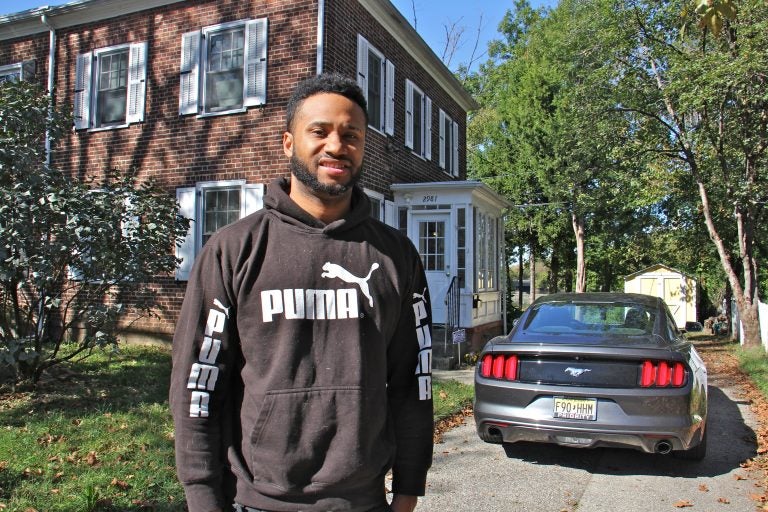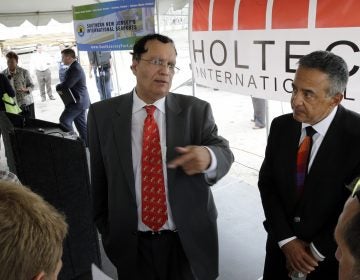Camden on the rise? New data show poverty is falling
Listen 4:21
Since landing a job as a welder at Holtec, Kenneth Hammon has purchased a home in Camden and a sports car. (Emma Lee/WHYY)
Ken Hammon’s driveway says it all.
About halfway down Tuckahoe Road in South Camden, sits the black Mustang the 31-year-old bought thanks to a life-changing job at Holtec International. The energy company recently opened a $300 million plant that manufactures small nuclear reactors in the city.
The tidy, three-bedroom house the muscle car is parked next to? Hammon bought that, too, after being hired as a welder last fall.
Roughly a year ago, he was a college student with two jobs, struggling to pay rent — his piece of the American Dream nowhere in sight.
“This is the first time, ever, I’ve really seen my mother just overjoyed. She’s always had really strong beliefs in me, but now it’s unbelievable,” Hammon said during a recent interview, just before heading to work the second shift at Holtec.
Hammon is part of a wave of new hires across Camden between 2013 and 2016. According to federal labor statistics, 541 new positions were created in the city during that three-year span.
It’s no boom, but these jobs do help explain a noteworthy shift in Camden — poverty appears to be falling.
The most recent estimates from the U.S. Census Bureau show the city’s poverty rate fell 10 percent last year compared with the previous five-year average.
Camden’s poverty rate is now roughly 30 percent, the lowest it’s been in more than a decade.
“Whether you’re looking at Camden County at large or the city itself, there’s been what I would describe as healthy growth in income,” said veteran labor economist Mark Price, a staffer at the Keystone Research Center in Harrisburg.
The census estimates some of Camden’s poorest residents are making about $2,000 more a year than just a few years ago. A big boost if, for example, you’re earning $12,000, the federal poverty line for a single person.
Where did all these higher-paying jobs come from?
State incentives help generate 150 jobs
Over the last few years, New Jersey has handed out nearly $18 million in tax credits to private companies who moved to Camden.
Those companies, including Holtec International, have created 150 new jobs — brand new, not just new to Camden. And hundreds more may be on the way.
“If this is a full moon, we’re probably a quarter of the way through the waxing period,” said Timothy Lizura, chief operating officer of the New Jersey Economic Development Authority, the organization overseeing the tax breaks.
In the end, the authority is slated to give out $1.7 billion to 32 companies in Camden, which is projected to bring nearly 2,000 new jobs to the city and, Lizura argued, many more if those employees buy lunch and other goods in the community.
Another explanation for Camden’s drop in poverty is less obvious. Recent “point-in-time” counts show the city’s street homeless population nearly doubled last year. In 2015, 70 people were living on the streets. One year later, there were 125.
Some people told outreach workers they’d lost income, while others couldn’t find work because of their criminal record. Still others were evicted.
“It’s hard to say one cause or what the exact causes are,” said Renee Koubiadis, who leads New Jersey’s Anti-Poverty Network.
Outlook still dim for city’s poorest
What is clear is that, without an address, essentially none of the homeless people in Camden were included in the Census, meaning they were literally left off the statistical radar.
Camden’s poorest don’t appear to be doing much better.
On a recent Saturday morning, the basement of Sacred Heart Church buzzed with activity as dozens of people stood in line to grab a free week of groceries from volunteers.
Susan Cidrone, who coordinates the monthly food pantry, said she’s seeing fewer people coming to the pantry, but she doesn’t think it’s because they no longer need it.
“I don’t believe it’s the jobs, even though Subaru is here and Holtec is here. I don’t think it’s going to affect this level of person that’s here today,” said Cidrone.
Lorian Harris has lived in Camden since the late 1960s. The 56-year-old comes to the food pantry whenever he’s out of work. Most recently, he’s had customer-service jobs.
“I’m not gonna say any bad things about the city,” Harris said. “I mean, I love it here, but we’re not doing great or anything. We’re just not.”
Bertha Flowers agreed. She works in the laundry room at a nursing home and still depends on pantries like the one at Sacred Heart. It’s one of the only ways her family eats.
“That first check has to go into rent. The second check has to pay all your bills,” said Flowers.
Through her red-rimmed glasses, Flowers scans the packed basement and considers those living in the streets outside.
It’s a thin line she prays she never crosses, especially if Camden is on the rise.
WHYY is your source for fact-based, in-depth journalism and information. As a nonprofit organization, we rely on financial support from readers like you. Please give today.





